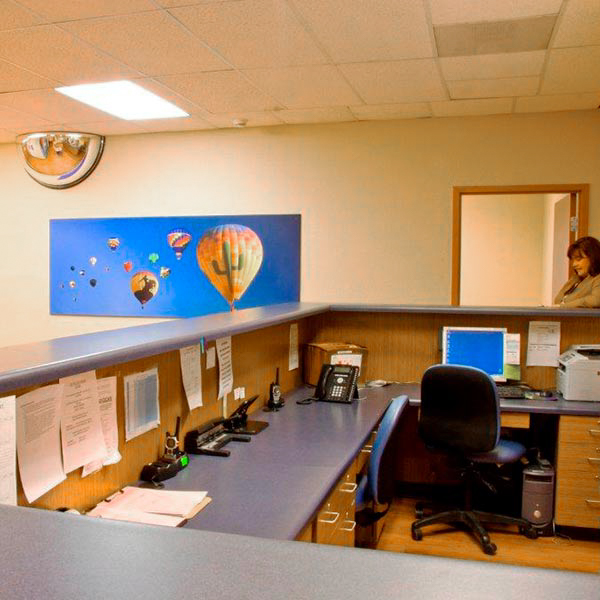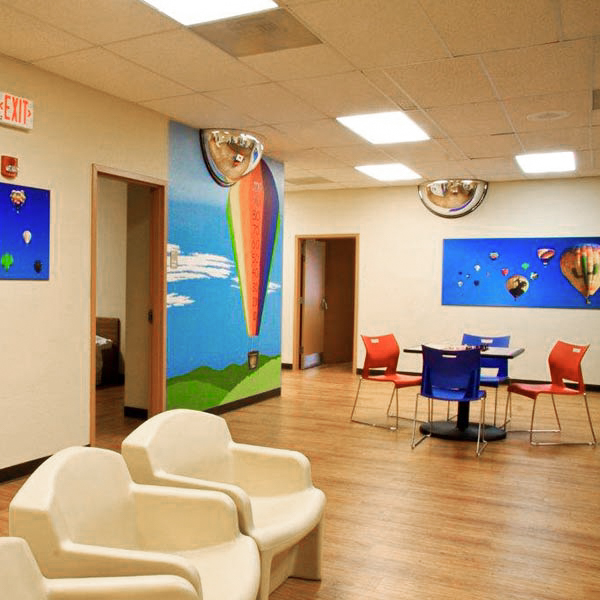Sonora Behavioral Health Hospital is dedicated to providing superior treatment to children, teens, and adults suffering from ODD. Located in Tucson, Sonora provides the comprehensive care needed to successfully manage mental health disorders and lead a life of recovery.
Treatment for ODD
Learn More About Treatment for ODD
Being challenging and difficult at times is part of being a kid, but if you have a child who has persistent tantrums, argues constantly, and shows disruptive behavior toward you and other authority figures it may indicate the presence of oppositional defiant disorder (ODD). With the average onset occurring before age 8, oppositional defiant disorder is characterized by a frequent and persistent pattern of angry or irritable mood, argumentative behavior, and vindictiveness. This disorder often causes conflicts with parents, teachers, supervisors, and peers.
Sonora Behavioral Health Hospital is a 140-bed leading acute inpatient psychiatric hospital in Tucson that is designed to treat children and adolescents, with oppositional defiant disorder. As a parent, you do not have to try and manage your child alone as the staff at Sonora can help. We can provide your child and family with the therapy and training needed to help build positive family interactions and get the problem behavior under control.
Helping a Loved One
Helping a Loved One or Family Member Get Treatment
As a parent, having a child with oppositional defiant disorder can be challenging and completely overwhelming at times. It is often helpful for parents to speak with a mental health professional who can help them develop skills that will help parent more effectively without causing unnecessary frustration. Here are some things that parent training can help you learn:
- Give effective timeouts
- Avoid parent struggles
- Remain calm and unemotional when facing opposition
- Take your own timeout if needed
- Recognize and praise child’s good behaviors
- Give child certain amount of control
- Establish a schedule for the family
- Limit consequences to those that can be consistently reinforced
The most important thing you can do for your child is show consistent, unconditional love and acceptance, even during difficult and disruptive circumstances. There are also some things that you can do at home to help control problem behaviors. These include:
- Model behavior you want your child to have
- Pick your battles
- Set limits and enforce consequences
- Work with your partner and others in the household to ensure consistent discipline
- Assign your child household chores
It is not uncommon for your child to not be cooperative at first and you are most likely going to have setbacks and relapses. However, with consistency and perseverance, hard work will pay off with improved behavior and relationships.
Why Choose Us
Why Consider Treatment at Sonora Behavioral Health
Children with oppositional defiant disorder have such a disturbance in behavior that it can cause clinically significant impairment in social, occupational, or academic functioning. They may have problems at school with teachers and may struggle to make or keep friends. Additionally, children with ODD may also have other conditions such as depression, anxiety, or learning disorders that, if left untreated, can be very difficult for parents and extremely frustrating for the child. If ODD continues to be left untreated, it can lead to even more severe problems down the road such as conduct disorder, substance abuse, and delinquency.
In many instances, treating oppositional defiant disorder involves several types of psychotherapy and training for your child, which is why an inpatient treatment center is one of the most effective treatment options because it can provide the variety of therapeutic interventions needed. Individual therapy can help children learn to manage their anger and express feelings in a more health manner. Family counseling sessions can help to improve communication and relationships, and help members of the family learn how to work together. In addition to helping the child identify patterns that are leading to their behavior problems, an inpatient program can help parents learn to develop skills that will allow them to parent their children in a more positive way that is less frustrating for everyone.
Philosophy & Benefits
ODD Treatment Philosophy and Benefits
As the leading psychiatric treatment center in Tucson for ODD, we make it our mission to provide superior behavioral healthcare services to the people, communities, and hospitals we serve. We employ an evidence-based treatment protocol that teaches effective coping skills that vastly increase the probability of successful outpatient treatment upon discharge. Our fully qualified staff is dedicated to providing comprehensive medical and psychiatric assessments and diagnostic services, treat acute illness in a sensitive and caring manner, and assist patients in regaining and maintaining their highest level of functioning.
Types of Treatment
Types of Treatment Offered at Sonora Behavioral Health Hospital
Upon arrival to our psychiatric hospital, each patient will complete an initial assessment that will include a physical examination, collection of medical history, a psychiatric evaluation, and a psychological assessment. At this time, we will also identify social skills, cultural and family issues, and determine any other needs that the patient may have. We use a multidisciplinary approach with each patient and our psychiatric clinical team is composed of psychiatrists, psychiatric nurses, social workers, therapists, internists, and expressive art therapists who are all trained and experienced in treating individuals with emotional health and substance abuse issues. All treatment plans are individualized and include the following methods:
Medication management: It is not common for medication to be used to treat ODD unless another disorder also exists. A psychiatrist sees all patients daily to ensure medication effectiveness and medication management. Additionally, all patients receive individual medication education.
Group therapy: At our treatment center the main form of treatment is daily group sessions. We do not use process groups, but instead use solution-focused groups that teach patients a variety of skills that will help them learn how to interact more positively with others. Some of our group topics include sleep, hygiene, coping skills, stress management, self-awareness, relaxation, and self-help skills training.
Family meetings: Family members are involved in all aspects of the treatment process and receive education about their loved ones condition. In addition, family members are in constant communication with case managers throughout their loved one’s stay.
Additional treatment methods may include the following:
- Daily meetings with social worker
- Weekly dietary groups
- Expressive therapy include art therapy
- Recreation therapy
Continuing Care
Continuing Care and Levels of Treatment
The discharge planning process begins as soon as a patient is admitted to our hospital. Within 48 hours of admission, a social worker will evaluate each patient for available resources including placement, transportation, and aftercare treatment. When it is time for the patient to leave inpatient treatment, the social worker will coordinate placement with the patient, family, agency, or private insurance. They will also coordinate transportation from the hospital on the day of discharge to the patient’s next placement as well as aftercare treatment appointments based on each individual’s needs.
For adult patients that no longer require the intense level of psychiatric care provided by inpatient treatment, Sonora Behavioral Health Hospital offers outpatient treatment that consist of nine to twelve hours of group therapy each week. These groups allow participants to process real-life scenarios as they happen and get the support they need as well as practice the new techniques they are learning. These eight to twelve weeks of intensive treatment give participants the chance to use group to work through emotional and psychological issues that keep them locked in a state of distress. Through our outpatient programs patients learn techniques that they will continue to use for the rest of their lives to stay healthy and happy.
Our partial hospitalization program (PHP) and our intensive outpatient program (IOP) allow patients to live at home and attend school or go back to work. PHP is held 5 days a week for 6 hours a day, while IOP is held 3 days a week for 3 hours a day. Both programs have a mental health and chemical dependency track. In addition to PHP and IOP, we have an aftercare program for alumni held monthly for as long as the patient needs.














